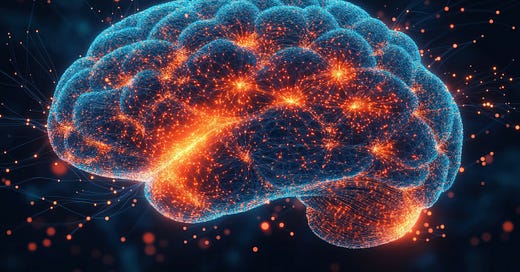Research Hit: New Insights into the Intelligent Brain
New research shows three types of intelligence and that connectivity is king
Aren’t you currently writing on the high-performing brain?
Yes, in my Handbook of the Brain in Business I break down the concept of the high-performing brain - and high performance is not just to do with intelligence. Even so this research, just out, is fascinating as it gives us the most detailed insight into the intelligent brain yet.
Tell me more…
Jonas Thiele et al., of the University of Würzburg in Germany, analysed data of over 800 individuals whose data had been collected as part of the Human Connectome Project. But they wanted to move away from making intelligence predictions that in the end prove less accurate than taking an intelligence test. There have ben multiple attempts to predict intelligence from scanning data with reasonable accuracy.
How did they do that?
Well, they tried to understand the main processes that underlie intelligence - larger datasets are now making this more feasible. And they found some interesting things.
What did they find?
They identified three types of intelligence.
Only three!
Yes, that doesn’t sound like much and much less than many IQ tests measure. These are:
Fluid intelligence - ability to solve problems, recognise patterns, and process new information
Crystallised intelligence - the body of knowledge and skills saved over the course of one’s life
General intelligence - which is basically a combination of the above two
Interestingly also when making predictive models the best performance was achieved using general intelligence, followed by crystallised, and then fluid intelligence.
Can we predict intelligence from brain scans?
This is what these researchers then tried to do. As mentioned, many researchers, have already been able to predict intelligence from brain scans but not that accurately. These researchers took this a step further. They discovered that individual regions play less of a role - this means there is no single seat of intelligence. But rather the number of hubs used and their distribution across the brain.
So intelligence is a global property of the brain defined by broad brain connectivity and adaptability.
And can this be changed?
As I always say - everything in the brain is learnable and changeable. But only to a degree.
It suggests that broad experience and using the brain in whole activities is more important than say focused single activities. Something that I write about in the Handbook - broad experience helps many processes in the brain. And contributes to intelligence.
So don’t just do IQ tests to build IQ
No - build experience in multiple areas and engage you brain in multiple ways. That will help build cognitive ability and intelligence.
Jonas A Thiele, Joshua Faskowitz, Olaf Sporns, Kirsten Hilger.
Choosing explanation over performance: Insights from machine learning-based prediction of human intelligence from brain connectivity.
PNAS Nexus, 2024; 3 (12)
DOI: 10.1093/pnasnexus/pgae519






